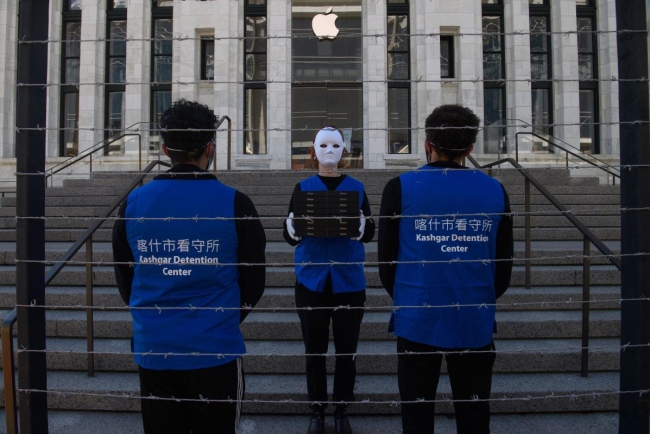You have /5 articles left.
Sign up for a free account or log in.

Protesters in Washington, D.C., on March 4 called for divestment from Uyghur forced labor. A similar effort is playing out at some U.S. colleges.
Nicholas Kamm, AFP/iStock/Getty Images Plus
Rizwangul NurMuhammad, a Uyghur student at Cornell University, has been vocal for years about the Chinese government’s detention of her brother and the atrocities Beijing has committed against the ethnic minority in China. So when her Chinese classmates jeered and walked out of a campus event last week after she asked a U.S. congresswoman about the Uyghur genocide, NurMuhammad saw it as the long arm of Chinese government influence at play.
The incident occurred at a March 10 colloquium for the Cornell Institute of Public Affairs, where NurMuhammad is earning a master’s degree in public administration. At the event, NurMuhammad shared details of her brother’s story: he was detained in 2017, later declared a separatist and hasn’t been heard from since. NurMuhammad later asked the speaker—Elissa Slotkin, a Democratic congresswoman from Michigan and a Cornell graduate—about the lack of sanctions by the U.S. government as China continues its campaign of human rights violations against Uyghurs.
“There is a strong understanding in Congress that there is something terrible going on with the Uyghurs in China: the forced labor, the human rights violations, the forced indoctrination,” Slotkin responded, joining the event via Zoom. “Democrats and Republicans actually agree that there are real problems going on.”
The Uyghurs, a largely Muslim minority group heavily concentrated in Xinjiang Province and long oppressed by the Chinese government, have faced forced labor, involuntary sterilization and various other human rights violations.
At Slotkin’s first mention of Uyghurs, dozens of students in the room stood up and walked out, according to a video reviewed by Inside Higher Ed. Off-camera, an unidentified voice can be heard saying that Chinese students are leaving.
“Almost half of the attendees walked out. When they walked out, some of us noticed that some were booing and taunting me,” NurMuhammad said. “And I actually heard some of them laughing.”
Now NurMuhammad is alleging intimidation, while Chinese students claim to be the targets of xenophobia. And Cornell—which has a robust population of students from China—is stuck in the middle, trying to sort out a geopolitical clash distilled on campus.
The Fallout
Slotkin showed her support for NurMuhammad, addressing the issue in a Twitter thread. Former Wisconsin governor Scott Walker, a Republican, has also signaled support. But at Cornell, NurMuhammad said, the response has been disappointing. Statements from administrators have painted Chinese students as victims and omitted her name and perspective in emailed statements, she said.
“I would have expected a better response from Cornell, but that was not the case,” she said. “In the first email, they watered down the genocide to human rights violations, and then they defended the intimidating actions from Chinese students, describing it as peaceful protesting.”
That email, sent on March 11, was one of several shared with Inside Higher Ed by a Cornell student. Written by Matt Hall, the director of the Cornell Institute of Public Affairs, it emphasized the importance of dialogue and tolerant conversation.
“At the same time, we must also respect that walkouts are a legitimate form of protest and an appropriate expression of disapproval,” Hall wrote. “As public leaders, we have a duty to promote peaceful demonstrations, even for those that we may disagree with. We must also uphold the principles of inclusion in voicing opposition; this includes being respectful and civil toward our colleagues, and not using social media to cast them as a demographic group or in derogatory ways.”
A subsequent email sent by Hall on Thursday morning—and shared by the university in lieu of a statement—acknowledged the “hurt and division” that occurred following the event.
“I want to directly speak to the uniquely vulnerable position that our colleague Rizwangul has faced,” Hall wrote. “I apologize for the hurt you have experienced and regret if my previous message did not reflect a full appreciation for the complicated dynamics that impact you so personally. No [Cornell Institute for Public Affairs] student should feel unsafe or unwelcome.”
But some Chinese students suggest that the reason for the walkout was more complicated.
Though the walkout began as soon as Slotkin mentioned the mistreatment of Uyghurs, that wasn’t the reason students left, said William Wang, a Chinese student earning a master’s degree in public administration and the president of the Cornell Public Affairs Society.
“We left today’s colloquium because we felt that the atmosphere in that room was extremely hostile towards us, and we did not feel that we could participate in any meaningful discussions whatsoever,” Wang said in a letter to Cornell Institute for Public Affairs leadership.
He wrote that one student noted the high percentage of Chinese students in the program and asked Slotkin “whether international students should study public policy in a democratic country rather than in their home country. As much as I tried to assume no malevolence [sic] intentions, as a Chinese international student, I felt uncomfortable being called out, not to mention the fact that the response was also revolved around ‘Chinese international students’ instead of the entire international student body, which has always been an integral part of Cornell community.”
Wang’s letter bears the signatures of dozens of Chinese students at Cornell.
In an email to Inside Higher Ed, Wang said that Slotkin’s remarks made Chinese students feel unsafe and that they walked out not over the Uyghur comment but for the sake of their mental health.
“The colloquium was supposed to be a career development class that teaches us things related to leadership skills, team building, etc. Instead, we got a biased, xenophobic, sinophobic, and American-exceptionalist representative who talked extensively about how China will become the next threat to the US as the Soviet Union was decades ago,” Wang said via email.
He described the walkout as “literally the most peaceful and least threatening form of protesting.”
Wang’s letter to leadership, which includes his title as the president of the Cornell Public Affairs Society beneath his signature, has created friction within the student organization he leads.
Damien R. Sharp, a public administration master’s student at Cornell and executive vice president of the Cornell Public Affairs Society, said Wang violated the group’s bylaws with his letter to leadership by acting independently and breaking with traditions of impartiality. He noted that other board members do not support Wang’s statement.
Sharp also called for reconciliation in an email sent to Cornell leadership: “The walkout of some of our classmates from the room during Thursday’s colloquium and subsequent discussions over email lead me to believe that there may be a need for a safe space for civil discourse on the matter,” Sharp wrote. “In the coming days, CPAS will work to hold a town hall in order to provide students with a space to meaningfully engage with one another on these topics and will collaborate with the Cornell Institute for Public Affairs (CIPA) administration should it choose to take part. As always, CPAS remains committed to serving all students of the CIPA community.”
Chinese Influence on U.S. Campuses
Though Chinese students on U.S. campuses may be thousands of miles from home, they are always within their government’s reach, said John Metz, executive director of the Athenai Institute, a political nonprofit focused on diminishing China’s influence on U.S. colleges. The group’s efforts include advocating for the closure of Confucius Institutes—cultural programs at colleges, funded by Chinese government grants—urging universities to disclose ties to China and protecting students and faculty from efforts to silence criticism of China’s government.
“Quite simply, the [Chinese Communist Party] does not see its control as ending at China’s borders. It sees Confucius Institutes and Chinese Students and Scholars Associations (CSSAs) as proxies for controlling discourse on campus around the world, with Chinese consulates sometimes directly pressuring these groups to prevent events critical of Chinese government policies from taking place,” Metz said by email, adding that universities often fear that taking China on will affect tuition revenue.
Metz said he also works to push universities “to divest from entities complicit in the genocide of Uyghurs and other human rights abuses in China.” That effort is catching on with some students.
At Catholic University of America, pressure from students, who founded an Athenai Institute there, prompted the administration to audit its endowment to identify and divest from holdings related to the human rights violations against the Uyghurs, The Washington Post reported in August 2020.
Catholic University officials did not respond to a request for comment. Neither did officials at George Washington University or Georgetown University, where students have also pressured administrators to take similar actions, pushing for divestment from companies that have been known to use forced Uyghur labor. But students at GWU and Georgetown say the universities have been largely silent on the issue of divestment.
“All too often, universities have been unwilling to protect students, especially Uyghurs, Tibetans, and Chinese dissidents, who face repression,” Metz said. “We believe that divestment—the systematic elimination of financial dependency on Chinese companies and proxies of the Chinese state—will reduce the incentive for universities to take the side of the oppressor and instead [help them] be moral leaders for their communities and for the country as a whole.”
As NurMuhammad reflects on the issue at Cornell, she feels that the backlash to her comments extends beyond her campus and threatens the academic environment in the U.S. She also points to efforts to intimidate her on social media. NurMuhammad doesn’t know if her brother—whom she hasn’t heard from since his detention in 2017—is alive, but she plans to keep speaking out about his arrest and hopes that colleges stop downplaying the violence against Uyghurs. It’s the kind of situation, she suggests, where there is a clear right and wrong and where there’s no place for neutrality.
“There are no two sides to the genocide that is happening,” NurMuhammad said.




